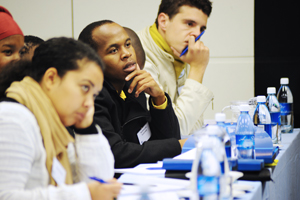Conference grooms student leaders
26 July 2010 Among those who attended the Emerging Student Leaders programme were (from left) Mica La Vita, Matlebyane Kudumela, and Roy Morrison
Among those who attended the Emerging Student Leaders programme were (from left) Mica La Vita, Matlebyane Kudumela, and Roy Morrison
You cannot be a leader without followers or without goals - this was the prevailing theme at UCT's Emerging Student Leaders Programme.
On 11 July, UCT's Department: Student Affairs, together with the Centre for Higher Education Development (CHED) and the Career Development Programme (CDP), welcomed more than 100 UCT students to the annual Emerging Student Leaders Conference.
The vision behind this programme is to contribute to the university's mission of producing well-rounded graduates able to face the challenges of an inter-connected society.
Central to this programme is the promotion of the values of good citizenship, human rights, sensitivity to human impact on the environment, building a culture which promotes and respects diversity, and the development of students' internal capacity through role modelling and peer learning.
Throughout the week the students attended presentations that promoted participation and interactive learning. Presenters included distinguished speakers from various disciplines, including deputy vice-chancellor Professor Crain Soudien, and Professors Francis Petersen and Pamela Schwikkard, deans of the faculties of Engineering & the Built Environment and Law, respectively.
Also presenting was Clem Sunter, world-renowned professional speaker, scenario planner and author of the best-selling book The Mind of a Fox: Scenario Planning in Action.
Schwikkard, the first female dean of law at UCT, addressed the issue of gender equality in leadership positions. She reminded the students that "the biggest barrier to our progression is our own prejudices", adding that "as a leader, one must continuously engage in and evaluate these to ensure that they aren't a barrier to you or to others".
Sunter, drawing on years of experience as a scenario planner as well as from his bestselling book, urged the students to combine the aspects of having 'the mind of a fox' - full of ideas and stretching the boundaries of imagination - with the single-minded focus of the 'hedgehog', in order to pursue one of many ideas until it succeeds.
Professor Richard Calland of the Department of Public Law addressed issues of leadership within the context of the South African constitution. He challenged students to "be careful in our leadership to think across classes", and added that "what seems a very powerful idea for us, very much through our eyes as the middle class, can at times be exclusive of other views".
Participants were recruited from diverse backgrounds, ranging from first-year to senior postgraduate students. The group included two PhD students and four master's students. All of UCT's six faculties were represented, as well as both residence-based and off-campus students, international and South African students, with women making up 55% of the 2010 intake.
Additionally, 20 mentors were selected to assist the students on this journey. The mentors are senior student leaders at UCT.
 This work is licensed under a Creative Commons Attribution-NoDerivatives 4.0 International License.
This work is licensed under a Creative Commons Attribution-NoDerivatives 4.0 International License.
Please view the republishing articles page for more information.










